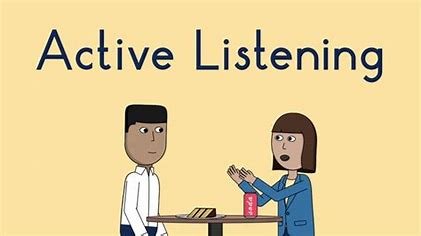Active listening is a powerful tool for fostering deeper connections and understanding in relationships, whether romantic, familial, or with friends. It involves being fully present, engaged, and attuned to the speaker, not just passively hearing their words but understanding the emotions behind them.

1. Be Fully Present
- Give Your Undivided Attention: Put down your phone, turn off distractions, and focus entirely on the person speaking. This shows that you value their words and time.
- Mind Your Body Language: Non-verbal cues are a huge part of communication. Use open body language (e.g., facing the person, leaning slightly forward) to show you’re engaged.
2. Listen Without Interrupting
- Let Them Finish: Resist the urge to interrupt, even if you have something important to say. Allow the speaker to complete their thoughts before responding.
- Pause Before You Respond: Take a moment after the speaker finishes talking to process the information before offering a response. This gives the speaker time to feel fully heard.
3. Reflect and Clarify
- Paraphrase or Summarize: Reflect back what you’ve heard to confirm understanding. For example, “What I hear you saying is that you feel frustrated because…” This shows you’re engaged and helps clarify any misunderstandings.
- Ask Open-Ended Questions: Instead of offering solutions immediately, ask questions that encourage deeper conversation. Questions like, “How did that make you feel?” or “What can I do to support you?” invite the speaker to share more.
4. Empathize with Their Emotions
- Validate Their Feelings: Acknowledge their emotions even if you don’t agree with their perspective. Saying something like, “I can see why you’d feel that way” helps the person feel heard and understood.
- Put Yourself in Their Shoes: Try to understand the situation from their perspective, which can deepen your connection and help you respond more thoughtfully.
5. Avoid Judging or Jumping to Solutions
- Resist the Urge to Fix: Sometimes, people just want to be heard, not fixed. If your partner or friend is venting, they might not need advice—just support. Offer empathy rather than immediate solutions unless asked.
- Suspend Judgment: Even if you don’t agree with what’s being said, listen without criticizing or judging. Everyone has their own perspective, and understanding their viewpoint is the first step toward resolution.
6. Use Positive Body Language and Verbal Cues
- Nod and Acknowledge: Simple gestures like nodding your head, making eye contact, and using verbal affirmations such as “I see” or “I understand” can show the speaker you’re engaged and listening attentively.
- Mirror Their Emotions: Reflecting the speaker’s emotional tone (e.g., expressing sympathy when they’re sad or excitement when they’re happy) helps strengthen the emotional connection.
7. Stay Focused on the Speaker’s Needs
- Don’t Steal the Spotlight: Active listening is about the other person. Avoid turning the conversation toward your own experiences unless it’s relevant to the discussion or the speaker asks for your input.
- Respect Their Pace: Everyone processes emotions and thoughts at different speeds. Don’t rush them; give them space to share at their own pace.
8. Avoid Multi-tasking
- Be Mindful of Distractions: When you multi-task (checking your phone, watching TV, etc.) during a conversation, it can make the other person feel unimportant. Focus on the conversation rather than dividing your attention.
9. Be Patient and Non-reactive
- Stay Calm, Even When It’s Difficult: Active listening requires patience, especially in emotionally charged conversations. If the other person is upset, try to remain calm and non-reactive. This helps maintain a safe space for open communication.
10. Offer Constructive Feedback or Support (When Appropriate)
- Wait for the Right Moment: Once you’ve listened fully, offer feedback or support that aligns with the person’s needs. If they need advice, provide it gently, and if they just need a listening ear, offer comfort and validation.
Why Active Listening Matters in Relationships:
- Builds Trust: When someone feels heard and understood, it deepens the level of trust in the relationship.
- Strengthens Emotional Connections: Active listening fosters empathy and shows that you care about the other person’s thoughts and feelings.
- Reduces Conflict: By truly hearing someone out, you can prevent misunderstandings that may escalate into arguments.
- Encourages Open Communication: People are more likely to open up and share when they feel supported and listened to without fear of judgment.
